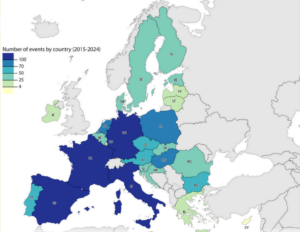EASE Talks n°8 – An overview of the international sport events organized in European countries
This discussion about the international sport events organized in each European country has been enriched by the contributions from Piotr Poplawski, Managing Director of the Institute for Sport Governance (ISG, Poland) and from Jan Skircka, IBU World Championship Bialthon 2024 venue manager (Czech Republic).
In the latest months, EASE organized a study on the international sport events organized in Europe. An « International sport event » has to bring together contestants from other countries, at the European or international level. To know more about the willingness of each country to host these events, EASE did not include in the study those which are held every year in the same country.
A quantitative database has been produced by EASE staff, to know how many sport events were organized in each European country between 2015 and 2024 – this period enables to take into account the countries’ willingness before and after the Covid-19 health crisis. The aim is to understand whether there have been any breakthroughs. For now, the database features 1.365 events from 40 different sports.
Then, a Google Form has been sent to partners in all the 27 European countries, to know more about three questions :
- How many sport events has thecountry organized since 2015 ? (we don’t look for exhaustivity, we mainly want to draw parallels between countries).
- Do the public authorities and the population support the organization of these international sport events ?
- What are the priorities given to these sport events by the country and the organizing committees ? (Economic growth, social impact, sporting excellence, physical activity, diplomatic influence, etc.)
A European culture of sport events in urban environment ?
The country that organises the most international sporting events is Italy (140 events, Table 2). The four other most populous countries are also the biggest event organisers (France, Spain, Germany and Poland, in that order). Hungary comes sixth (71 events) despite being only the 13th most populous country in the EU. Croatia is also the 12th biggest organizer (48 events) while it is only the 20th most populous country. According to those involved in the Hungarian and Croatian sports movements, this is a consequence of the desire to occupy diplomatic space through these events.
Conversely, Romania (6th largest population in the EU but 17th largest number of events organised) and Belgium (8th largest population and 19th largest number of events organised) are not very keen on organising events. They moreover focus on their specific sports (wrestling and weightlifting in Romania, cycling, volleyball and hockey in Belgium).

Most international sporting events take place in the country’s largest cities, which limits the enthusiasm of the suburban and rural populations. In Poland, the EU’s 5th most populous country, only 7 cities hosted more than 80 sport events. The same was true for Finland (Helsinki, Espoo, Lathi and Tampere) and Ireland (Dublin and Cork) France and Spain have spread their events more evenly, with more than 20 cities hosting events since 2015.
A moderate and disparate impact of the Covid-19 health crisis on the sport events organisation since 2020
Despite the activity break in 2020, most European countries have resumed their efforts to organise international sport competitions.
As part of its policy to increase the number of sport events it hosts, Croatia has seen its number increase after 2021. Other countries, such as the Netherlands and Poland, had no major impact and remained stable. Activity in Finland and Estonia has been halved. According to those surveyed, this is a direct consequence of the health crisis, as the recovery has been slower in the northern countries.
A gap between the political willingness and the aspirations of European countries’ population ?
Most of the sport event actors interviewed for this study (Google Form) noted a gap between the political willingness and that of the public. On average, that of the public (8.07/10) is slightly higher than the authorities (7.84/10). States that organise a lot of events have less public support. France, Estonia and Hungary are particularly affected by this. On the other hand, in countries such as Luxemburg and Slovenia, the events are more exceptional and generates public enthusiasm.
“We are a sport nation and people in our country love sport. Hosting an international event is always a pleasure for our inhabitants” (National Olympic Committee of Slovenia).
Six key priorities for successful sport events
The organizing committee and the public authorities have unveiled their priorities for the organisation of events, to find out what impact they should have on their country’s society. The surveyed were asked to select and rate these priorities on the Google Form according to their importance :
- The host city must promote the event (Croatia, Hungary)
- Events must generate economic benefits (Belgium, Croatia)
- It should improve the diplomatic influence of the country (Poland, Hungary)
- The event must benefit to the host city (Spain, France)
- Population’s sporting activity must increase (Slovenia, Estonia)
- The excellence of national athletes should be promoted (Ireland, Slovenia)